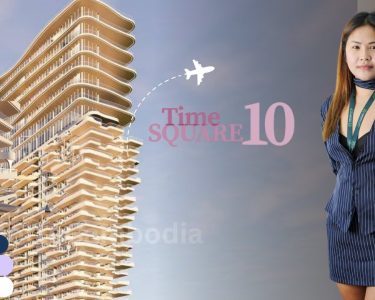Cambodia Investment Review
Phnom Penh’s real estate market continued to face challenges in Q1 2025, as cautious investor sentiment, fluctuating demand, and subdued economic confidence affected key sectors including office, retail, residential, and industrial spaces. CBRE Cambodia’s quarterly market update revealed a landscape marked by modest absorption rates, downward rental pressure, and a continued reshuffling of tenant preferences.
Office Sector: Soft Demand Persists as Market Seeks Equilibrium
The office sector remained under pressure with limited new take-up recorded in Q1. No new office buildings were completed during the period, leaving total office stock in Phnom Penh at approximately 837,000 sqm. Average occupancy across Grade B buildings slightly declined to 62%, with Grade A holding marginally better at 65%. Rental rates across all grades dropped by 1.1% quarter-on-quarter, continuing a trend that reflects landlords’ efforts to retain tenants and remain competitive.
The report highlighted that flight-to-quality and consolidation were key trends, as occupiers sought better value and more efficient layouts amid rising operational cost awareness. Tenants are increasingly leveraging the oversupply to renegotiate terms or relocate to better-positioned properties.

Retail Sector: Local Brands Expand as Foreign Players Remain Cautious
Phnom Penh’s retail sector remained subdued in Q1 2025, particularly among foreign entrants who have continued to delay entry due to regional economic concerns and political uncertainties in export markets. However, local F&B and fashion brands continued to expand, especially in community mall formats.
Average occupancy rates declined across both prime and community malls. Prime mall occupancy fell to 71%, a 2% drop quarter-on-quarter, while community malls recorded a more stable occupancy rate of 69%. Rental rates declined by 1.6% in prime locations and by 1.1% in community malls, reflecting weak consumer spending and cautious retail expansion strategies.
Despite the market slowdown, new concepts such as pop-up stores and hybrid retail-office spaces have started to appear, driven by demand from smaller local operators seeking short-term commitments and flexibility.

Residential Sector: Serviced Apartments Hit by Expats’ Departure, Condos See Slight Uptick
The residential sector remained bifurcated, with serviced apartments underperforming while the condominium segment recorded slight gains.
Read More: CBRE Report: Cambodian Market Faces Uncertain Path Under Trump 2.0 Policy Shifts
Serviced apartment occupancy fell for the third consecutive quarter, hitting 58%, amid a decline in the expatriate population and ongoing global economic uncertainty. Average rents declined by 1.7% for high-end apartments and 1.4% for mid-range units.
In contrast, the condominium market showed signs of stabilizing. Primary market launches increased marginally, with developers offering more flexible payment terms and discounts to stimulate sales. Secondary market prices remained flat, although high-end units saw a 0.3% quarter-on-quarter increase due to limited resale inventory in some prime locations.

Industrial and Logistics: Growth Continues Amid Manufacturing Optimism
The industrial and logistics sectors remained the most resilient segment in Q1 2025, buoyed by continued growth in Cambodia’s manufacturing sector, which expanded by 10% according to government data.
Several new industrial parks broke ground in Q1, while demand for factory and warehouse space remained high, especially along major highways and near the Phnom Penh Logistics Hub. CBRE noted increasing interest from Chinese and regional investors exploring relocation options to Cambodia amid global supply chain realignment and ongoing tariff disputes.
Occupancy in established special economic zones (SEZs) remained above 85%, while average rental rates for logistics space increased slightly by 0.5% quarter-on-quarter.

Outlook: Market Cautiously Optimistic as Infrastructure Projects Advance
While short-term demand remains soft in most segments, CBRE noted that several large-scale infrastructure projects—such as the Techo International Airport (Phase 1 at 95% completion), new flyovers, and improved highways—are expected to enhance Phnom Penh’s connectivity and logistics appeal.
Ongoing global economic uncertainty, including tariff disputes, foreign aid suspensions, and investor wariness in the region, will likely continue to shape the market in Q2. However, Cambodia’s stable political climate and pro-investment policies remain key factors supporting long-term confidence.
CBRE concluded that developers and landlords should continue to focus on tenant retention, value-added amenities, and flexible lease structures to navigate the current market conditions.





